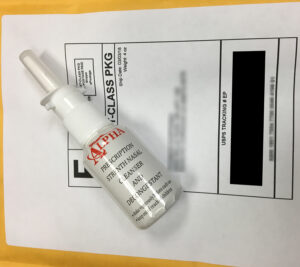On the day after Christmas in 2017, Wyatt Cox died after overdosing on the drug fentanyl. The loss devastated the 25-year-old Florida man’s family.
Investigators soon discovered Cox had received a bottle of fentanyl-infused nasal spray in the mail.
That’s when the Postal Inspection Service got involved.
The agency — working with the Drug Enforcement Administration, the Department of Justice and state and local law enforcement partners — helped pinpoint a suspect who was later convicted.
The case is one example of how the Inspection Service is helping to address the rise in opioid overdoses, a public health crisis that killed 50,000 Americans in 2017 alone.
“The Postal Inspection Service’s mission is to protect the mail — and that includes protecting it from the dangers of illegal narcotics,” said Chief Postal Inspector Gary Barksdale. “The opioid crisis is a major challenge for all law enforcement agencies, but we’re working together to address this crisis and stem the tide.”
‘Dark web’ rising
The investigation into Cox’s death demonstrates the key role the Inspection Service plays in the fight against opioid overdoes.
During the investigation, local postal inspectors analyzed mail data and discovered the package containing the nasal spray that killed Cox had been shipped from Madison, WI, which the Inspection Service’s Chicago Division oversees.
“Historically, we see fentanyl in powder or pill form. This was one of the first times we’d seen it in nasal spray form,” said Postal Inspector Kyle Rau, who works with the Inspection Service’s Contraband Interdiction and Investigations group.
Working with its law enforcement partners, the Inspection Service was able to pinpoint a suspect: Michael Schoenmann, a Dodgeville, WI, resident and self-described addict.
The investigators discovered Schoenmann was operating a vendor site on the “dark web,” a part of the internet accessible through special software that can allow users to remain anonymous or untraceable.
“He purchased the fentanyl from other vendors, then packaged it as a nasal spray to allow addicts, like himself, to use it undetected,” Rau said.
During a 2018 sting operation, postal inspectors observed Schoenmann mail six packages. After inspectors intercepted the packages, the suspect was taken into federal custody.
A search of Schoenmann’s home yielded controlled substances and seven nasal spray bottles that were labeled similarly to the bottle delivered to Cox.
The Inspection Service is not aware of other overdose deaths connected to Schoenmann’s opioid shipments, which were mailed to addresses throughout the United States before he was caught.
‘Our biggest asset’
In January, Schoenmann was sentenced to 12 years in federal prison.
During the sentencing, Cox’s mother, Melissa Cox, and other family members described their loss.
“My dearest Wyatt, my son,” Melissa Cox said, according to coverage by the Wisconsin State Journal. “I have no words. My heart has a huge hole. My life will never be the same.”
Rau said the Inspection Service is committed to protecting the mail system from being used for crimes like drug transportation and trafficking. He credits postal employees for their assistance.
“They are our biggest asset,” Rau said. “When they let us know about the suspicious things they see, whether reaching out to us first or telling us when we visit their facilities, it helps us do our job of keeping them and our customers safe.”

